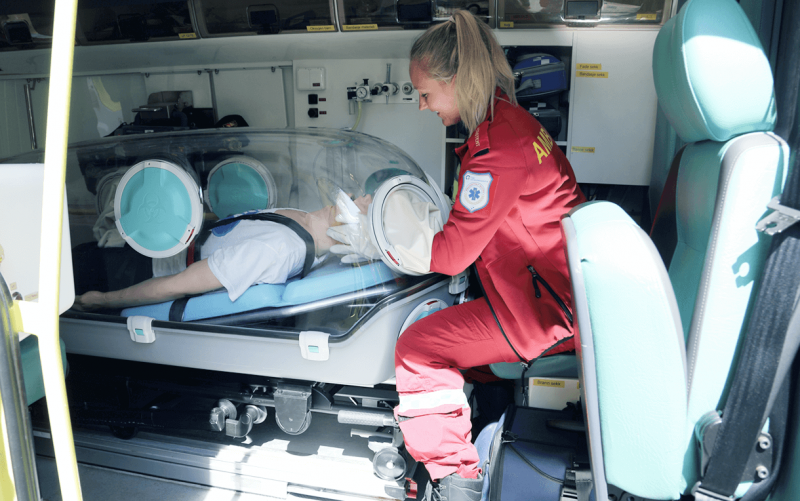
EpiGuard is a company founded in 2015, based on experiences from the Ebola epidemic in West Africa in 2014. The team of medical specialists from Oslo University Hospital was responsible for treatment and transportation of patients, including an Ebola-patient repatriated to Norway. In the emergency response work on the epidemic, they identified the need for new and improved equipment for transporting patients with high-risk infections. The result was EpiShuttle, developed together with Eker Design, focusing on patient and caregiver safety, patient comfort and improved medical treatment options.
“Our aim is to save the patient and increase protection of healthcare professionals and the environments.” Said Ellen Cathrine Andersen, CEO, EpiGuard
Positive Customer Impact
There are three main benefits of the EpiShuttle: 1. Patient Safety and Care 2. Safety of Health Care Professional 3. Cost and Operational Efficiency
The EpiShuttle is a single-patient isolation and transport system, designed to provide maximum patient safety and comfort while allowing critical care and treatment to be performed. The EpiShuttle can protect the environment from an infected patient or protect a vulnerable patient from a contaminated environment. The protection consists of two elements: A robust and completely sealed barrier between the patient and the surrounding environment, and a pressure difference that will prohibit leakage. The unique design allows patient monitoring and full intensive care treatment to be performed during transport, including emergency procedures like intubation and insertion of central venous catheters.
With the use of EpiShuttle, the need for disinfection of ambulances, helicopters or airplanes is reduced, and there will be less disruption of service.
For airport preparedness in case of suspicion of passengers arrive with highly infectious disease, the EpiShuttle provides a solution both for temporary isolation, and transport to hospital.
The Epishuttle is sold to several countries in Europe, as well as Singapore, Saudi Arabia, Namibia, and is donated through Norwegian MOH to WHO in Congo and Uganda.
Quote from customer:
“The new opportunity to isolate patients will have a significant impact on the working environment for rescuers, nurses and doctors,” said the head of Health Preparedness Department in Region Midtjylland.
The prehospital department in the region is working closely with the Aarhus University Hospital to develop a competence and education center for handling and transport of patients with infectious diseases such as SARS, MERS, Ebola and pneumonic plague.
“With the new insulation unit [EpiShuttle] we are raising transport safety to an international level. We can ensure that the infection is isolated from the point at which the patient is picked up and until the patient is placed in an isolation room at Aarhus University Hospital,” said Chief Physician in Region Midtjylland.

